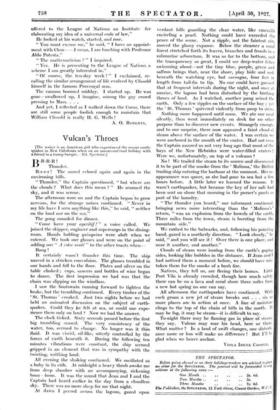Vulcan's Throes
[The writer is an American girl who experienced the recent earth- quakes in New Caledonia when on an unconventiOnal holiday with a friend in a tramp barque.--Ed. Spectator.] B-R-R-R ! Thunder. B-r-r-r ! The sound echoed again and again in the env ironing hills.
"Thunder," the Captain questioned, "but where are the clouds ? What does this mean ? " He scanned the sky, and it was serene.
The afternoon wore on and the Captain began to grow nervous, for the strange noises continued. "Never in my life have I seen anything like this," he said, " neither on the land nor on the sea."
The gong sounderA for dinner.
"Conic have your aperitif ! " a voice called. We joined the skipper, engineer and supercargo in the dining- room. Hands holding quinquina were aloft when we entered. We took our glasses and were on the point of adding our " votre sauté" to the other toasts when— Bang !
It certainly wasn't thunder this time. The ship moved in a stricken convulsion. The glasses trembled in our hands and fell to the floor. Plates and silver on the table clinked ; cups, saucers and bottles of wine began to dance. The first impression we had was that the chain was slipping on the windlass.
I saw the boatswain running forward to tighten the brake, but the trembling continued. Every timber of the 'St. Thomas' creaked. Just two nights before we had held an animated discussion on the subject of earth- quakes. Could they be felt at sea, or could one expe- rience them only on land ? Now we had the answer.
The clock ticked. Sixty seconds passed before the first big trembling ceased. The very consistency of the water, too, seemed to change. No longer was it thin fluid. It was viscid, oil-like, utterly controlled by the forces of earth beneath it. During the following ten minutes vibrations were constant, the ship seemed gripped in an element that was in sympathy with the twisting, writhing land.
All evening the • shaking continued. We oscillated as a baby in its crib. At midnight a heavy throb awoke me from deep slumber with an accompanying, sickening boom—boom. It was the sound that Jean and I and the Captain had heard- _earlier in the day from a cloudless sky. There was no more sleep for me that night. At dawn I peered across the lagoon, gazed upon verdant hills guarding the clear water, like emeralds encircling a pearl. Nothing could have exceeded the peace of the scene. Not a ripple, not the faintest stir, moved the glassy expanse. Below the steamer a coral forest stretched forth its leaves, branches and fronds in a submarine arboretum. It was so far to the bottom, and the transparency so great, I could see deep-water fishes swimming about—not the tiny blue, purple, green and saffron beings that, near the shore, play hide and seek beneath the watching eye, but earangue, four feet in length from tail-fin to tip. No one could have guessed that at frequent intervals during the night, and once at sunrise, the lagoon had been disturbed by the birthing throes of land. As I watched, another pang seized tk earth. Only a few ripples on the surface of the bay ; yet the St. Thomas' quivered violently from poop to stem.
Nothing more happened until noon. We ate our meal silently, then went immediately on deck for no other purpose than to discover new events. Strangely enough. and to our surprise, there now appeared a faint cloud of steam above the surface of the water. I was certain WI' were anchored in the mouth of the crater. Had not cm) the Captain assured us not very long ago that most of the bays of' the New Hebrides were water-filled craters Were we, unfortunately, on top of a volcano ?
No! We trailed the steam to its source and discovered it to be part of the smoke from the Malinoa,' the British trading ship entering the harbour at the moment. Her re- appearance was queer, as she had gone to sea but a few hours before. A little later we learned the reason. it wasn't earthquakes; but because the key of her safe had been sent on shore that morning in the purser's pants :1, part of the laundry.
" The thunder you heard," our informant continued. bringing news more interesting than the Malinoa's ' return, "was an explosion from the bowels of the earth. Three miles from the town, steam is bursting from 1 he mountain side." • We rushed to the bulwarks, mid, following his pointin;: hand, gazed in a northerly direction. "Look closely," hr said, "and you will see it ! Over there is one place, and near it another, and another."
Clouds of steam were issuing from the earth's gapin sides, looking like bubbles in the distance. If Jean and I had noticed them a moment before, we should have lin,r taken them for the smoke of a bush fire.
Natives, they tell us, are fleeing their homes. Littl, Port Vila is already crowded, though how much safety there can be on a lava and coral shore three miles from a new hot spring no one can say.
All afternoon the earthquakes have continued. Witi! each groan a new jet of steam breaks out . . . six yr more places are in action at once. A line of moisture clings to the top of the chain of hills in the north. may be fog, it may be steam—it is difficult to say.
To-night there may be flaming gas in place of steam they say. Vulcan may rear his head, here or there. What matter ? In a land of swift changes, one disturb- ance more or less will make no difference ! But glad when we heave anchor.
VIOLA IRENE COOPER.










































 Previous page
Previous page